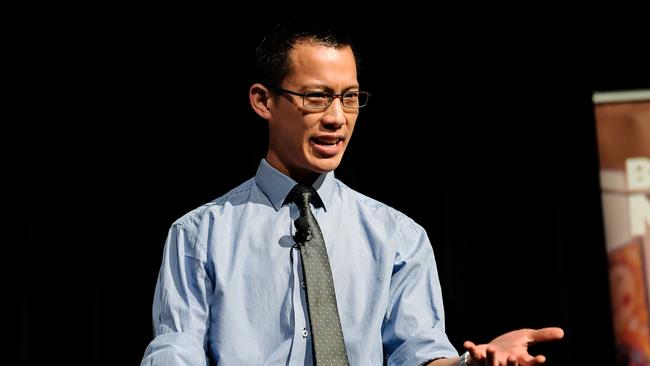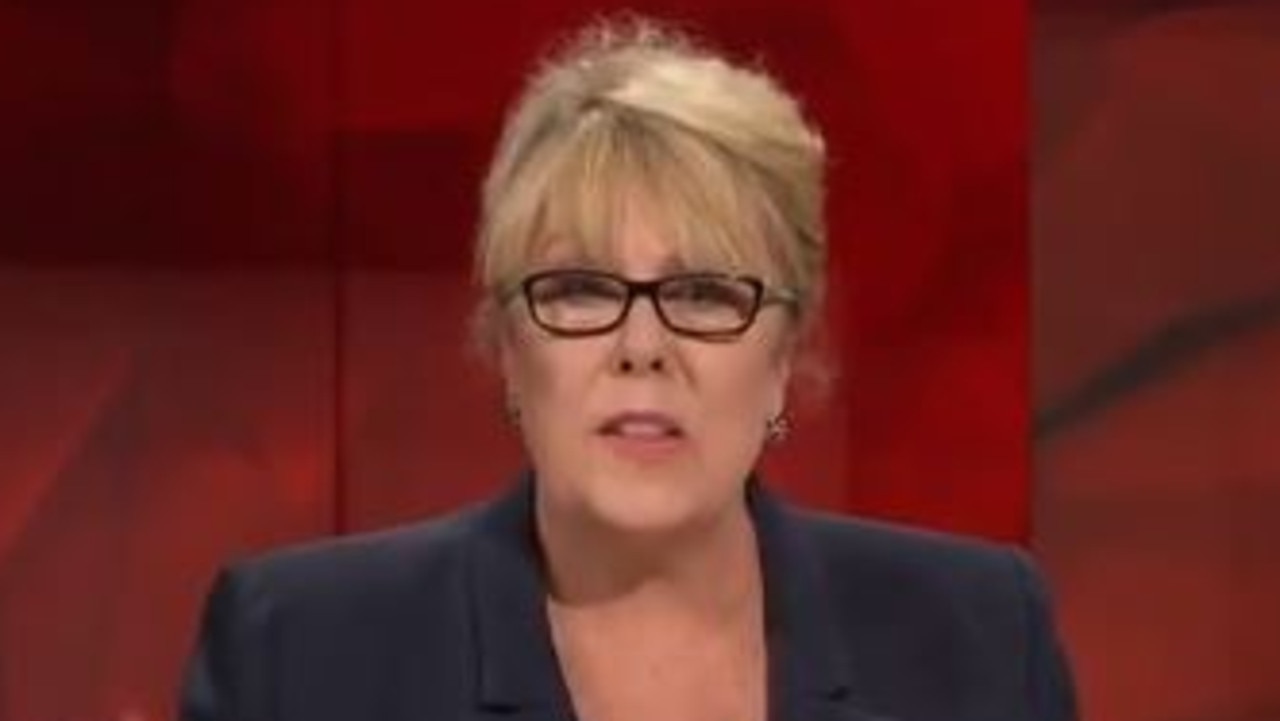Q&A recap: Tony Abbott’s Indigenous envoy role questioned
Indigenous education advocate Cindy Berwick took a swipe at Tony Abbott’s suitability for his Indigenous envoy role on an education-themed Q&A.

Indigenous education advocate Cindy Berwick has taken a swipe at the suitability of Tony Abbott to his new Indigenous envoy role, saying he has “the wrong end of the stick.”.
Ms Berwick made the comments during a school education themed broadcast of ABC’s Q&A on Monday night, which also featured a discussion on NAPLAN testing, Indigenous students, and the pressures of teaching.
Also on the panel was Internet mathematics teaching sensation Eddie Woo, Finnish-Australian education scholar from the Gonski Institute Pasi Sahlberg, author and former teacher Gabbie Stroud, and Centre for Independent Studies education researcher Jennifer Buckingham.
T ONY ABBOTT AS INDIGENOUS ENVOY
Ms Berwick questioned Mr Abbott’s expertise on the subject of indigenous education.
“What can I say about him? … I have one question of his educational expertise and experience to actually make claims like he does.
“He’s got the wrong end of the stick when he talks about attendance. If you look at kids, Aboriginal kids in New South Wales, where a review was done not so long ago … if you take out the chronic non-attendees, you’ll find most Aboriginal kids attend school most of the time. What they are is not engaged in classrooms.
“The more Aboriginal people that are actually involved, the more … Aboriginal role models, the more professional learning we’ve done, the more building up of the cultural capability over the workforce … that can only be a good thing,” she said.
FUNDING
On school funding, internet mathematics teaching sensation Eddie Woo said that while he thinks it’s important for parents to have “some degree of choice” in the styling of school their children go to, that ultimately “funding makes a really big difference” and criticised the current federal school funding model.
“I shake my head when I look at a federal level and hear the conversations about funding not making a difference. That class sizes don’t matter.
“When I walk into my Year 10 class and there are kids there with … special needs, dyslexia, hearing disabilities. Don’t tell me it doesn’t make a difference,” he said.
Education researcher Jennifer Buckingham said that “it’s absolutely true that our funding is not being targeted sufficiently heavily towards the children who need it the most.”
Pasi Sahlberg, originally from Finland, said that Australia’s school funding system was at odds with other OECD countries.
“If you put Australia into the big picture … internationally, one thing that makes this education system here very different is the way they are funded. Almost all the other OECD countries are giving more money to the schools that need it,” he said.
Mr Sahlberg also spoke of the importance of school teachers’ self-esteem during a conversation on Australia’s university requirements for teachers when compared with those in other countries.
“We want teachers with a self-esteem that feel they are professionals just like medical doctors and lawyers … If you don’t have the same degree, same level of preparation for that, it’s very hard to have that.”
TEACHER AND STUDENT BURNOUT
With the majority of the panellists having had experience as classroom teachers, there were several questions about the workload of teachers and school students.
Gabbie Stroud criticised a “standardised curriculum and professional teaching standards” for leading to teachers and students that are “suffering” from overwork and stress, and creating a “time where education in Australia … must be getting close to rock bottom”
“It’s this blanket one size fits all, let’s just churn it out and sprinkle out the education on all these kids and presumably they’ll all come out the other end and things will all be fine.
“The graphs are going down. The students are disengaged. The teachers are struggling and something needs to change.
“Teachers at the moment are … drowning not waving. They are in survival mode … It is driving them out of the profession.
“I had reached a point towards the end of my teaching career where I was thinking if the kids just stayed home today, I’d be able to get all my work done. That’s crazy talk. Right? I’m a teacher. It should be all about those children coming in,” she said.
Eddie Woo also criticised the amount of time teachers were required to spend on bureaucratic processes outside of their classroom teaching.
“Why do we live in a society that’s run by compliance and regulations that we have to tick boxes to? It’s because of the much bigger problem that the teacher workforce has been driven to. Why is it bureaucrats find themselves unable to trust the profession? That’s where we have to attack,” he said.
Pasi Sahlberg pointed out the long school day in Australia as a contributing factor, saying “Australia has the highest compulsory instruction hours required from your children throughout their compulsory education than any other country in the world.
“It means you already have a packed school of instruction and school days are much longer than elsewhere. That’s why you have much less time for play and many other things and recess and those things that make your school day lighter and more comfortable. That’s a big difference if you compare Australia to almost any other country in the world,” he said.
NAPLAN
Responding to a question on the negative impacts of the National Assessment Program — Literacy and Numeracy, Jennifer Buckingham said that:
“Linking NAPLAN as a cause of poor results doesn’t really make a lot of sense to me.”
“It’s snapshot at that point in time of where a school is progressing, where the students in the school are progressing with their learning. And it’s just providing information that wasn’t there before.
“In terms of the idea that NAPLAN is sort of creating a marketplace, I’ve not really seen any evidence of that,” Ms Buckingham said.
Author and former teacher Gabbie Stroud responded, saying that she was “quite tired” of hearing that NAPLAN was just a “snapshot” of a school.
“I have very serious concerns about NAPLAN and they … speak to that idea that I’ve raised about the standardisation of education.
“What we’re seeing now are our students are disengaged, they’re disheartened. They’re not excited to come to school. They’re not enthused about their learning. And this is the effect that NAPLAN is having.
“It’s offensive to me to hear that before NAPLAN we didn’t have any data. We did. We have teachers. You go in and you knock on the door. As a teacher … I can tell you at the end of the day, albeit I will be exhausted, but I can tell you what that child can read now and what new gains they made with their writing. And where they’re up to with their maths.
“It’s a great, great tragedy. I think we need to start having a very serious think about and conversation about NAPLAN and the impact that it’s having and more broadly that idea of standardisation.”
Jennifer Buckingham responded, saying that:
“From the perspective of a researcher, NAPLAN data is incredibly useful because we know more now about whether or not policies have been effective, we can see trends that we couldn’t see before,
“Standardised isn’t a dirty word, it just means it’s pegged against a benchmark that allows you to make some sort of assessment,” Ms Buckingham said.
On the use of NAPLAN performance data by parents in selecting a school for their child, Eddie Woo said:
“We have to recognise these tools often have a very good intent behind them but they often have more power than we intend.”
Cindy Berwick said that she “wasn’t a fan of NAPLAN” as it was written “through the cultural lens of the dominant society”, which she argued disadvantaged Aboriginal children.
“Our history of accessing schooling hasn’t been great over the last 30 years. And that will take a while for the policies and practices to actually affect,” she said. “It’s been in my time that we were excluded from school.”


